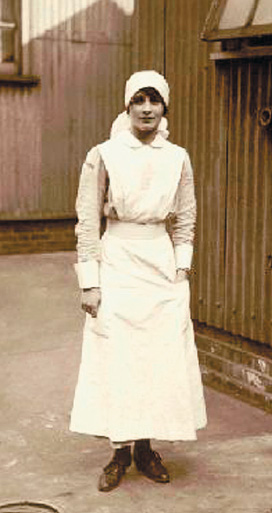A History of Western Society: Printed Page 839
A History of Western Society, Value Edition: Printed Page 846
INDIVIDUALS IN SOCIETY
Vera Brittain
 | ONLINE DOCUMENT ASSIGNMENT |
| What role did wartime propaganda play in encouraging women like Vera Brittain to get involved in the war effort? Analyze a variety of propaganda posters calling for women to serve as military nurses. Then complete a writing assignment based on the evidence and details from this chapter. |

Although the Great War upended millions of lives, it struck Europe’s young people with the greatest force. For Vera Brittain (1893–1970), as for so many in her generation, the war became life’s defining experience, which she captured forever in her famous autobiography, Testament of Youth (1933).
Brittain grew up in a wealthy business family in northern England, bristling at small-town conventions and discrimination against women. Very close to her brother Edward, two years her junior, Brittain read voraciously and dreamed of being a successful writer. Finishing boarding school and overcoming her father’s objections, she prepared for Oxford’s rigorous entry exams and won a scholarship to its women’s college. Brittain also fell in love with Roland Leighton, an equally brilliant student from a literary family and her brother’s best friend. All three, along with two other close friends, Victor Richardson and Geoffrey Thurlow, confidently prepared to enter Oxford in late 1914.
When war suddenly loomed in July 1914, Brittain shared with millions of Europeans a surge of patriotic support for her government, a prowar enthusiasm she later downplayed in her published writings. She wrote in her diary that her “great fear” was that England would declare its neutrality and commit the “grossest treachery” toward France.* She supported Leighton’s decision to enlist, agreeing with his glamorous view of war as “very ennobling and very beautiful.” Later, exchanging anxious letters with Leighton in France in 1915, Brittain began to see the conflict in personal, human terms. She wondered if any victory or defeat could be worth her fiancé’s life.
Struggling to quell her doubts, Brittain redoubled her commitment to England’s cause and volunteered as an army nurse. For the next three years, she served with distinction in military hospitals in London, Malta, and northern France, repeatedly torn between the vision of noble sacrifice and the reality of human tragedy. Having lost sexual inhibitions while caring for mangled male bodies, she longed to consummate her love with Leighton. Awaiting his return on leave on Christmas Day in 1915, she was greeted instead with a telegram: he had been killed two days before.
Leighton’s death was the first of several devastating blows that eventually overwhelmed Brittain’s idealistic patriotism. In 1917 Thurlow and then Richardson died from gruesome wounds. In early 1918, as the last great German offensive covered the floors of her war-zone hospital with maimed and dying German prisoners, the bone-weary Brittain felt a common humanity and saw only more victims. A few weeks later her brother Edward — her last hope — died in action. When the war ended, she was, she said, a “complete automaton,” with her “deepest emotions paralyzed if not dead.”
Returning to Oxford and finishing her studies, Brittain gradually recovered. She formed a deep, restorative friendship with another talented woman writer, Winifred Holtby; published novels and articles; and became a leader in the feminist campaign for gender equality. She also married and had children. But her wartime memories were always with her. Finally, Brittain succeeded in coming to grips with them in Testament of Youth, her powerful antiwar autobiography. The unflinching narrative spoke to the experiences of an entire generation and became a runaway bestseller. Above all, Brittain captured the contradictory character of the war, in which millions of young people found excitement, courage, and common purpose but succeeded only in destroying their lives with their superhuman efforts and futile sacrifices. Becoming increasingly committed to pacifism, Brittain opposed England’s entry into World War II.
*Quoted in the excellent study P. Berry and M. Bostridge, Vera Brittain: A Life (London: Virago Press, 2001), p. 59; additional quotations are from pp. 80 and 136.
QUESTIONS FOR ANALYSIS
Question
What were Brittain’s initial feelings toward the war? How and why did they change as the conflict continued?
Question
Why did Brittain volunteer as a nurse, as many women did? How might wartime nursing have influenced women of her generation?
Question
In portraying the contradictory character of World War I for Europe’s youth, was Brittain describing the character of all modern warfare?